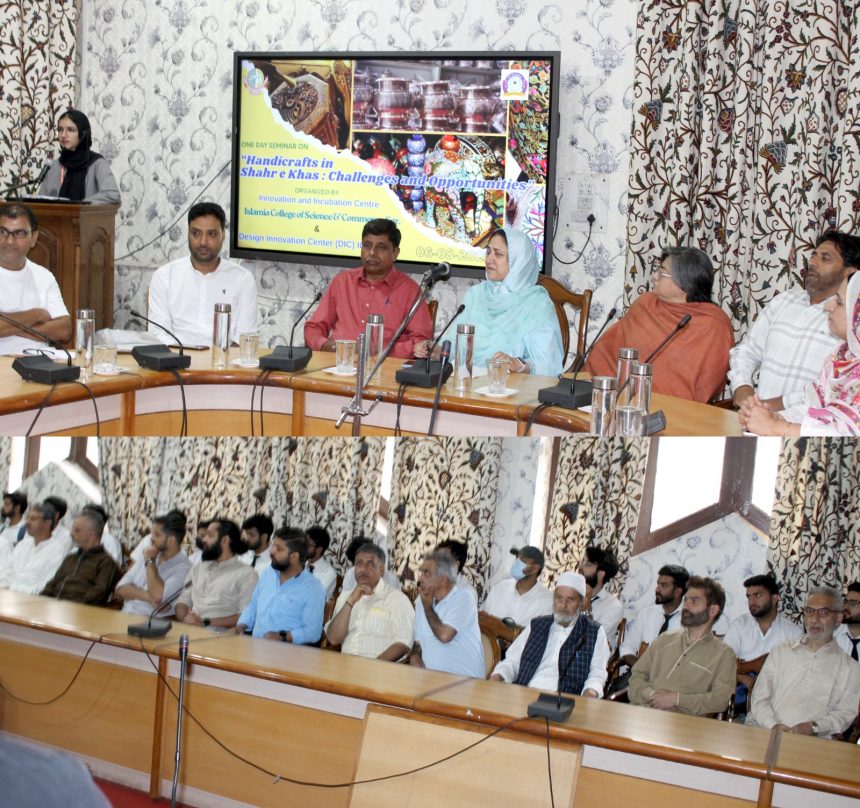Srinagar, Aug 06: Islamia College of Science and Commerce, Srinagar, held a significant one-day seminar titled “Handicrafts in Shahr-e-Khas: Challenges and Opportunities”, drawing artisans, academicians, researchers, government officials and industry leaders into a shared dialogue on safeguarding Kashmir’s centuries-old craft heritage.A statement issued here said that the event focused on the historical and cultural vibrancy of Shahr-e-Khas, Srinagar’s old city, which has long been the heart of traditional handicrafts such as papier-mâché, wood carving, Kani weaving, copperware, and carpet-making. The seminar was inaugurated by Principal Prof. (Dr.) Tehmina Yousuf, who, in her presidential address, stressed the need to reconnect traditional artisan knowledge with modern economic systems. “The real empowerment of the craft community lies in building sustainable linkages between their heritage and contemporary entrepreneurship,” she said. Dr. Zahoor Ahmad Jhat, Convenor of the Innovation and Incubation Centre, underlined the College’s proactive approach in integrating youth and start-ups into the craft economy through innovation and incubation models. Keynote speakers and panellists provided multifaceted perspectives. Prof. Arshad Suleh, Head of the Department of Art, College of Education, warned of the existential threats to traditional crafts due to lack of international exposure, dwindling artisan numbers, and the rise of machine-made imitations. Prof. Fayaz A. Nika, Dean, School of Management Studies, CUK, advocated for the active involvement of higher education institutions in craft revival through design thinking and managerial expertise. Aamina Asad, Chief Designer, Department of Handicrafts and Handlooms, and Dr. Yasir A. Mir of NIFT Srinagar, showcased ways to modernize Kashmir’s crafts through digital branding, product innovation and market intelligence. Interactive sessions empowered students, researchers, and aspiring entrepreneurs to discuss themes such as heritage preservation, export potential, design-led innovation, digital marketing, and incubation pathways. What set the event apart was the active participation of artisans from Shahr-e-Khas, who shared real-life experiences of resilience amid challenges like economic slowdown, fading interest among younger generations, and insufficient institutional support. The seminar marked a vibrant step toward creating a sustainable, innovation-driven ecosystem for Kashmir’s famed handicrafts — where tradition meets technology, and heritage fuels entrepreneurship.
Islamia College hosts seminar on ‘Handicrafts in Shahr-e-Khas’
Artisans, scholars & policymakers unite to explore challenges, opportunities in reviving craft

Sign Up For Daily Newsletter
Be keep up! Get the latest breaking news delivered straight to your inbox.
By signing up, you agree to our Terms of Use and acknowledge the data practices in our Privacy Policy. You may unsubscribe at any time.
Leave a Comment Leave a Comment
Stay Connected
Latest News
Recent Posts
- Delhi Airport issues passenger advisory amid inclement weather forecast
- Shri Mata Vaishno Devi Shrine Board refutes ‘negligence’ claims on pilgrim tragedy
- Jammu-Srinagar Highway Shut for fourth Day, Over 2,000 Vehicles Stranded
- 22 people killed, including four children in Russian strike on a residential building Kyiv: Ukrainian President Volodymyr Zelenskyy
- “Like automobiles, India, Japan can recreate same magic in batteries, semiconductors,” PM Modi says







